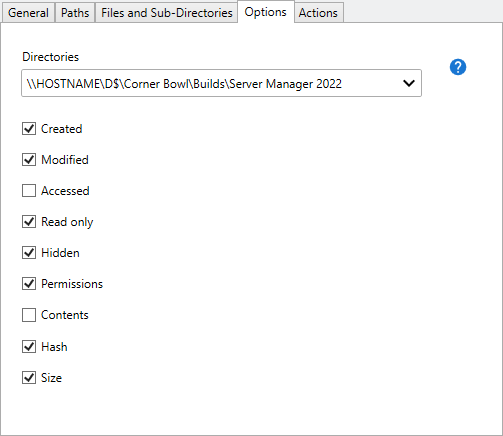Table of Contents
- Getting Started
- Agent-Based Monitoring
- Data Providers
- Directory Services
- Auditing
- Hosts
- Templates
- Template Properties
- Batch Update Templates
- Log Management Templates
- File and Directory Monitor Templates
- Windows Monitor Templates
- Account Lockout Monitor Template
- Logon Monitor Template
- CPU Monitor Template
- Memory Monitor Template
- Disk Space Monitor Template
- SMART Monitor Template
- Windows Update Template
- Process Monitor Template
- Service Monitor Template
- Performance Counter Monitor Template
- PowerShell Template
- Registry Value Monitor Template
- Active Directory User Monitor Template
- Active Directory User Integrity Monitor Template
- Task Scheduler Template
- Clock Synchronization Template
- Defragment NTFS Disks Template
- Network and Application Monitor Templates
- Database Monitor Template
- Directory Service Monitor Template
- DNS Blacklist Monitor Template
- DNS Monitor Template
- Domain Expiration Monitor Template
- Network Speed Monitor Template
- Ping Monitor Template
- Database Table Reseed
- SQL Server Shrink and Backup Template
- SSH Shell
- TCP Port Scan Monitor Template
- Website Monitor Template
- SSL Certificate Monitor Templates
- Email Monitor Templates
- SNMP Monitor Templates
- Monitors
- Reports
- Auto-Configurators
- Filters
- Actions
- Desktop Actions
- Email Actions
- Event Log Actions
- Executable Actions
- File Actions
- IIS IP Address Restriction Actions
- Microsoft Teams Actions
- PowerShell Actions
- Report Actions
- Service Actions
- SMS Actions
- SNMP Trap Actions
- Syslog Actions
- Template Actions
- IIS IP Address Restriction Actions
- Action Variables
- Schedules
- Environment Variables
- Options
- Account Lockout Monitoring and Reporting
- Merging Logs
- SNMP
- SSH Shell
- Syslog
- Exporting and Importing Configuration Objects
- Shared Views
- Auto-Config Host Assignment Properties
- General Executable Properties
- Assign Actions
- Assign Directories
- Assign Disks
- Assign Shares
- Assign Files
- Assign Consolidated Logs
- Assign Event Logs
- Assign Azure Audit Logs
- Target Files and Sub-Directories
- Define Log Entry Columns
- Define Log Entry Columns with Regular Expressions
- Define CSV and W3C Log Entry Columns
- Active Directory User and Group Filters
- Explicitly Assigned Logs
- File Explorer
- Report Columns
- Report Date/Time Ranges
- Report Security Event Log Filters
- Select Folder or File
- Executable Timeline
- Command Line Interface
- Troubleshooting
- Terminology
File Integrity Monitor Template
The File Integrity Monitor Template enables you to monitor a directory for changes made to files. The template scans directories using Windows Shares and SFTP/SSH to create file access, file attribute and file content baselines then continually re-scans to let you know when a file is accessed, modified or deleted.
The File Integrity Monitor Template uses Windows Shares, SFTP or FTP/S depending on the host type to scan directories on Windows, Unix, Linux and other operating systems. Access Permissions are scanned on Windows Servers using WMI.
How to configure the File Integrity Monitor Template:
- From the Menu Bar, select File | New. The Create New Object View displays.
- From the Create New Object View, expand Templates | File and Directory Monitors then select File Integrity Monitor. The New Template Properties View displays.
- The Template Properties view contains 6 tabs.
The Options Tab
-
Use the Directories drop-down to select the directory to configure.

Use the Files and Sub-Directories tab to specify the files and sub-directories to target and exclude. -
The following options are available:
Accessed Notifies you when a file is accessed. Modified Notifies you when a file is modified. Created Validates the file was not replaced with another file that contains a different creation time. Attributes Validates file attributes such as Hidden and Read-Only have not changed. Access Permissions Performs and exhaustive scan of file permissions then notifies you when any permissions have been added, modified or removed. File Contents Hash Performs a hash using the file contents then notifies you when any bits have changed. File Contents Baselines the entire file contents then validates no bits have changed. File Size Notifies you when the file size changes.
